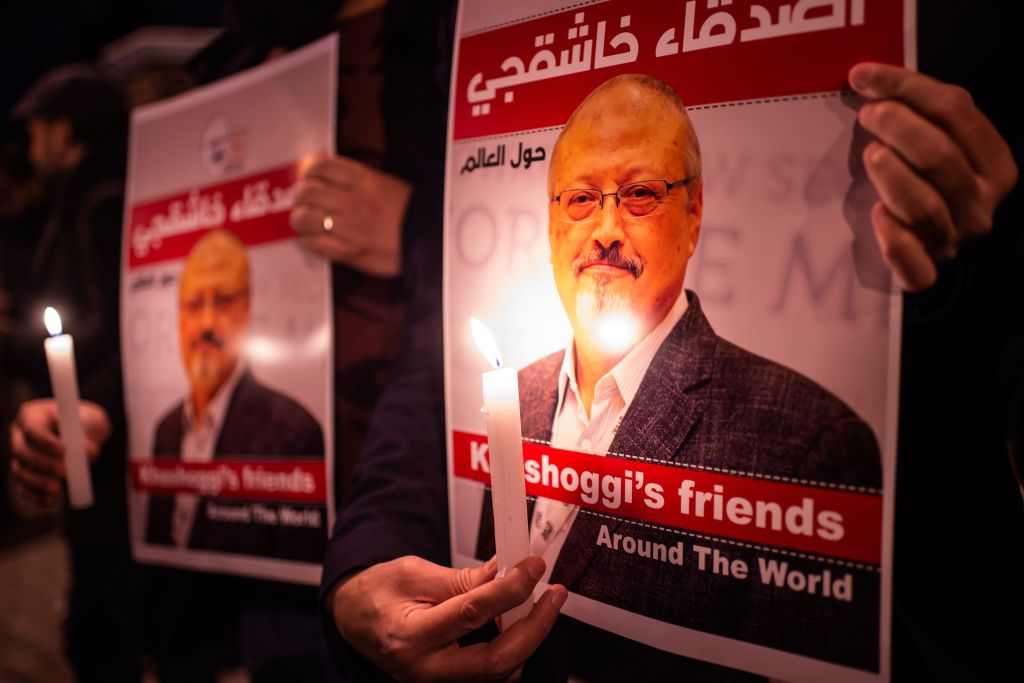
More than a year after he was killed inside the Saudi consulate in Istanbul, the case of journalist Jamal Khashoggi remains at the top of a list of the most serious threats to press freedom.
The list — released each month by the One Free Press Coalition, which was created by a dozen news organizations, including TIME, with the goal of defending journalists under attack — identifies ten of the most severe cases of threats to press freedom around the world.
Khashoggi, a columnist for the Washington Post who had criticized Saudi Crown Prince Mohamed bin Salman, was killed inside the Saudi consulate in Istanbul on Oct. 2, 2018. He was among the four journalists and one news organization named The Guardians as the TIME 2018 Person of the Year, recognized for his work in the face of serious threats to journalistic freedom.
Khashoggi’s death has remained a controversial topic in the thirteen months since he was killed. Despite findings from the CIA concluding that bin Salman ordered Khashoggi’s killing and a United Nations special report that found “credible evidence” calling for a deeper investigation into bin Salman’s role in the assassination, President Donald Trump has been criticized for his muted response over the murder and continuing to maintain ties with Saudi Arabia.
Bin Salman said he takes “full responsibility” for Khashoggi’s murder, but denied ordering the killing in an interview with 60 Minutes in September.
Other journalists on the list who have come under threat include an imprisoned reporter in Egypt who has been tortured and a detained Uzbek blogger.
Read about all 10 journalist on the November list here:
1. Jamal Khashoggi (Saudi Arabia): No resolution in violent killing inside Saudi consulate
The one-year anniversary of Khashoggi’s killing has passed without officials opening independent criminal investigation opened into his death, despite findings from U.S. intelligence officials and the United Nations pointing to bin Salman’s involvement. Although the Saudi prince has claimed responsibility for the murder, calling it a “mistake,” he has denied having a direct role.
2. Daphne Caruana Galizia (Malta): No resolution two years after reporter was murdered in Malta
More than two years have passed since the investigative reporter Daphne Caruana Galizia was killed in a car-bomb explosion in Malta. Though three men have been taken into detention in relation to her murder, no one has been brought to justice. Trial dates have not been announced, either.
3. Esraa Abdel Fattah (Egypt): Imprisoned and tortured over allegations of spreading false news
The Egyptian journalist Esraa Abdel Fattah was arrested on Oct. 13 and was one of at least seven journalists detained amid anti-government protests in Egypt. Abdel Fattah has said through lawyers that she would start a hunger strike to protest being abused while detained, saying she was tortured while in custody, including being beaten, hung from her handcuffs and choked while being asked to give up her cellphone password.
4. Azory Gwanda (Tanzania): Authorities withholding information about journalist missing for two years
Nov. 21 will mark two years since the freelance journalist Azory Gwanda disappeared. He had previously been investigating mysterious killings in Tanzania. Though a Tanzanian government official said in July that Gwanda had “disappeared and died,” they later backtracked on the statement.
5. Miroslava Breach Velducea (Mexico): Trial continues in Mexican correspondent’s murder
A correspondent for Mexico City newspaper La Jornada, Miroslava Breach Velducea was killed in March 2017 for her reporting on ties between politicians and organized crime. The trial in her murder case is ongoing, though the next court date has not been set.
6. Shujaat Bukhari (India): Suspects still at large in editor’s killing
Shujaat Bukhari, founder and editor of the newspaper Rising Kashmir, was fatally shot along with two police officers in June 2018. While police have identified four suspects, one of whom was later killed, officials have given few other updates in the case.
7. Nafosat Olloshukurova (Uzbekistan): Uzbek blogger detained in psychiatric center
The Uzbek blogger Nafosat Olloshukurova has been detained in a psychiatric center for at least a month, following 10 days detention on charges of petty hooliganism and taking part in unauthorized assemblies. Prior to her arrest, Olloshukurova was covering writer Mahmud Rajabov’s efforts to have a criminal case against him dropped. Her family says they have not been able to contact her since late September.
8. Mahmoud Hussein (Egypt): Detained Egyptian journalist’s pre-trial continuously extended
Mahmoud Hussein, a journalist who was working with Al Jazeera, was arrested in Dec. 2016 on charges of spreading false news and inciting actions against state institutions. Though his detention was initially said to be for 15 days, it has been repeatedly extended every 45 days. The arrest and detention is tied to a 2016 documentary about conscription in Egypt, which the government says uses fake footage.
9. Agba Jalingo (Nigeria): Nigerian publisher faces life sentence if found guilty in upcoming trial
Nigerian publisher Agba Jalingo was arrested on Aug. 22 and later charged with disturbance of public peace and treason for writings and social media posts about Cross River State Gov. Benedict Ayade. If found guilty of treason, Jalingo could face a life sentence in prison.
10. Martin Inoua Doulguet (Chad): Chadian newspaper leaders face fines and unequal punishment
The director of the newspaper Salam Info, Martin Inoua Doulguet has been arrested and faces charges of conspiracy and defamation brought from a Chad government health official. Doulguet is awaiting a date to appeal his three-year sentence, which began in September.
More Must-Reads from TIME
- L.A. Fires Show Reality of 1.5°C of Warming
- Home Losses From L.A. Fires Hasten ‘An Uninsurable Future’
- The Women Refusing to Participate in Trump’s Economy
- Bad Bunny On Heartbreak and New Album
- How to Dress Warmly for Cold Weather
- We’re Lucky to Have Been Alive in the Age of David Lynch
- The Motivational Trick That Makes You Exercise Harder
- Column: No One Won The War in Gaza
Contact us at letters@time.com